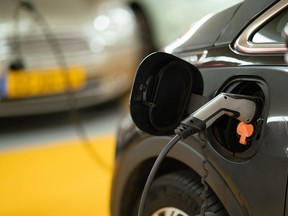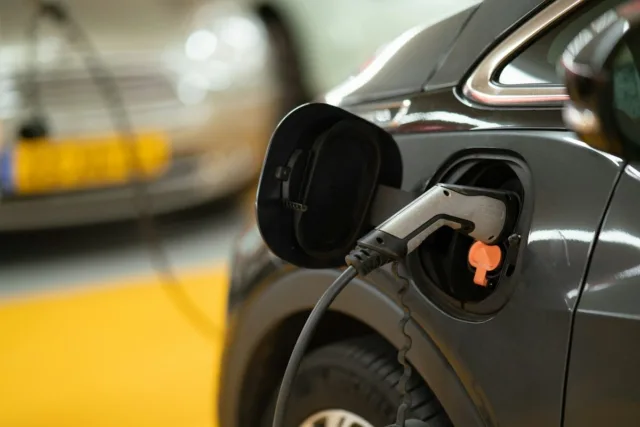
Article content
Manitoba Premier Wab Kinew has finally gotten off the bench and is calling on the federal government to drop its tariffs on Chinese electric vehicles.
Advertisement 2
Story continues below
Article content
While other Western Canadian premiers have long been critical of the federal Liberals’ 100 per cent tariffs on Chinese electric vehicles because of the retaliatory tariffs they triggered on Canada’s canola industry, Kinew had been largely silent on the issue until earlier this month.
Article content
Recommended Videos
Article content
That all changed when China’s Ambassador to Canada, Wang Di, made some important comments on Canadian national television, signalling that China would scrap its canola tariffs if Canada got rid of its tariffs on Chinese electric vehicles.
“If Canada removes the unilateral unjustified tariffs on Chinese products, China will reciprocate accordingly,” said Di. “And if the EV tariffs are removed, then China will also remove the tariffs on relevant products of Canada.”
Article content
Advertisement 3
Story continues below
Article content
After that interview, Kinew finally stepped in, sending a strongly worded letter to Prime Minister Mark Carney calling for a sharp change in Canada’s approach.
“Canada’s trade policy must balance long term industrial goals and national security with immediate economic realities as well as the national responsibility to grow every region of Canada’s economy,” wrote Kinew. “While protecting our automotive sector is important, the current approach has created a two-front trade war that disproportionately impacts Western Canada.”
“The Ambassador’s comments offer a clear path to de-escalation and relief for our agricultural sector.”
While Kinew is somewhat late to the party, he’s right that seeking to protect Canada’s fledging electric vehicle industry at the expense of Western Canadian farmers is wrong.
Advertisement 4
Story continues below
Article content
Here’s the backstory: in concert with the Biden administration, former prime minister Justin Trudeau imposed 100 per cent tariffs on Chinese electric vehicles back in the fall of 2024.
China’s response began in March of this year, when it slapped a 100 per cent tariff on Canadian canola oil and meal imports, followed by a 75.8 per cent provisional anti-dumping duty on Canadian canola seed last month.
This has devastated Western Canadian farmers, processors, and exporters, for whom China is a leading market for their goods.
The Trudeau government’s official justification for its tariffs on Chinese electric vehicles was that China has an “unfair advantage in the global marketplace” resulting from China’s overcapacity and oversupply of electric vehicles.
Advertisement 5
Story continues below
Article content
But the real reason the Trudeau government took this action is that the federal government, in concert with the Ford government in Ontario, has invested over $52 billion in trying to build an electric vehicle manufacturing industry and supply chain in Central Canada.
The Liberals are trying to stop Canadian consumers from being able to buy cheaper Chinese electric vehicles because so much taxpayer money is on the line seeking to prop up the North American electric vehicle manufacturing.
But the electric vehicle industry is in decline. Jut eight per cent of Canadian consumers are currently buying electric vehicles, and investment is collapsing. Stellantis, for example, just announced it is cancelling the retooling of its Brampton plant, which was supposed to build electric vehicles, to instead build Jeep Compass models in Illinois. That’s despite previous federal and Ontario government handouts to the tune of hundreds of millions of dollars for the retooling effort.
Advertisement 6
Story continues below
Article content
Yes, it’s true that there are security concerns when it comes to Chinese electric vehicles. But Canadians buy all kinds of products from China and even use Chinese-based apps on their smartphones. If Canadian consumers have concerns about security when it comes to Chinese cars, other products, or even apps, they shouldn’t buy or download them. But Canadian consumers deserve the freedom of choice. And the federal government shouldn’t be blocking that at the expense of Western Canada’s agricultural sector.
According to media reports, Carney won’t say whether he’ll repeal the tariffs on Chinese electric vehicles in order to pursue a trade détente with China. Based on Carney’s comments, that suggests the federal government is at least considering the possibility. It’s high time for Carney to make the right call for Canadian farmers, drop the electric vehicle tariffs, and facilitate greater consumer choice.
— Jay Goldberg is the Canadian Affairs Manager at the Consumer Choice Center, and a guest writer for the Winnipeg Sun.
Have thoughts on what’s going on in Winnipeg, Manitoba, Canada, or across the world? Send us a letter to the editor at wpgsun.letters@kleinmedia.ca.
Article content










Comments